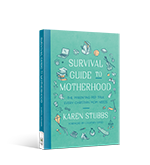
Sign Up for Updates
Connect
TOPICS
- Latest Blog
- Fiction
- Inspirational/Devotional
- Men's Christian Living
- Prophecy
- Women's Christian Living
- View All
ARCHIVES
Is Halloween a Pagan Holiday? How Its True History May Surprise You
Posted on Sep 28, 2023 Topic : Men's Christian Living, Women's Christian Living
Posted by : Danielle Hitchen

In the twentieth century, the claim that Halloween is thoroughly pagan, originating at the ancient Celtic festival of Samhain (“sow-en”), has become widely spread and frequently parroted. Advocates of this story purport that Halloween is simply a Christianization of this pagan spiritual practice, that Samhain is the Celtic Lord of Death, and this celebration was in his honor. None of these things are true.
First, remember that the feast of All Saints shifts from May 13 to November 1 at the pressure of German churches – a region which did not even know of Samhain, much less celebrate it or have cause to pressure the Church to move the date in order to “Christianize” a pagan holiday.
Secondly, reliable scholarship in anthropology, archeology, literature, and history will tell you that all we really know about ancient Samhain festivals is that around late October/early November there was often a large feast and bonfire to mark the end of the harvest season and the start of winter. This is nothing to get excited about; festivals to mark the close of the harvest and the start of the winter season were popular across Europe and often featured bonfires (for burning organic waste materials and cooking animals they couldn’t board for the winter), feasting (all those animals!), and merrymaking. “No pre-Christian or medieval historical source clearly associates Samhain with any of the three pillars of the pagan hypothesis: veneration of the dead, supernatural activity linked to the temporary proximity to the otherworld, or the celebration of a Celtic New Year’s Eve.”
Third, to the extent that a character by the name of Samhain (or similar) is featured is Celtic folklore, he is a minor character at best – certainly not their God of Death.
It is true that many pagan cultures celebrated a feast to their god of the harvest around this time of year. In agrarian societies, good harvests were of paramount importance to their survival after all. As far as we know these festivals to communal harvest gods were not a factor in the Church’s placement of the Allhallowtide celebrations. The irony in all this, of course, is that Christian communities which eschew Halloween in favor of alternative “Harvest Fests” are far closer to the secular and pagan rituals of the season than those who just celebrate Halloween! That being said, our God is a God who gives a bountiful harvest and is worthy of thanks and praise for his provision.
So…where did all the misinformation about Halloween come from?
Partly, it was a rumor spread about by Protestants during the Reformation as a way of discrediting and disparaging the Roman Catholic church. Partly, it was the work of Sir James Frazer at the turn of the 20th century who claims to have “discovered” connections between an ancient Celtic fire-festival and the appeasement of the dead. But mostly these ideas became entrenched after the pseudo-scholar Margaret Murray published a couple books claiming to have uncovered the secrets – including dates, rituals, and secret priestly hierarchies – of the pre-Christian religions of northern Europe. Her research methods and conclusions have been thoroughly discredited by actual historians and anthropologists, but by that point the damage was done. The work of Frazer and Murray was voraciously latched upon and then vociferously defended by the neopagan movement of the last century.
Unfortunately, these falsehoods were further ingrained in the 1970s and 80s by a man name Jack Chick. His fallacious cartoons alleging that Halloween is Satan’s birthday and that the Roman Catholic church is actually a cult which worships ancient Babylonian deities (including their use of All Souls Day to worship the dead) were turned into tracts warning parents about occult-practicing pagans poisoning candy and seeking children to sacrifice to their dark master on All Hallows’ Eve. (And these aren’t even the worst of Jack Chick’s conspiracy theories!) Unfortunately, hundreds of thousands of these tracts were widely disseminated and the information did, in fact, make its way into the public consciousness even if many never traced the hearsay back to its completely unfounded source.
It should be noted that even though Halloween seems to have no historical root in ancient pagan practices, neopagans of the twentieth century and beyond do continue to refer to October 31 as Samhain and mark it as a special occasion in their rituals (thanks, Margaret Murray). Should this give Christians pause as we consider celebrating Halloween? Probably not. To a certain extent, things take on the meaning you give them. Is a black cat bad luck? If you want it to be, or…it’s just a cat. Are Easter eggs a form of worshipping an ancient fertility goddess? If you want them to be or…they’re just a fun seasonal treat. Are Christmas evergreens actually paying homage to the Roman god Saturn? If you want them to…or they’re a beautiful symbol of Christ’s everlasting, ever-living love. But…is Halloween pagan? If you want it to be. Neopagans have certainly decided it is. But as Christians, we have claim to the true origin of the holiday in addition to a set of significant communal and religious traditions during Allhallowtide. There’s no good reason to reject the holiday wholesale.

Read more in Sacred Seasons by Danielle Hitchen

